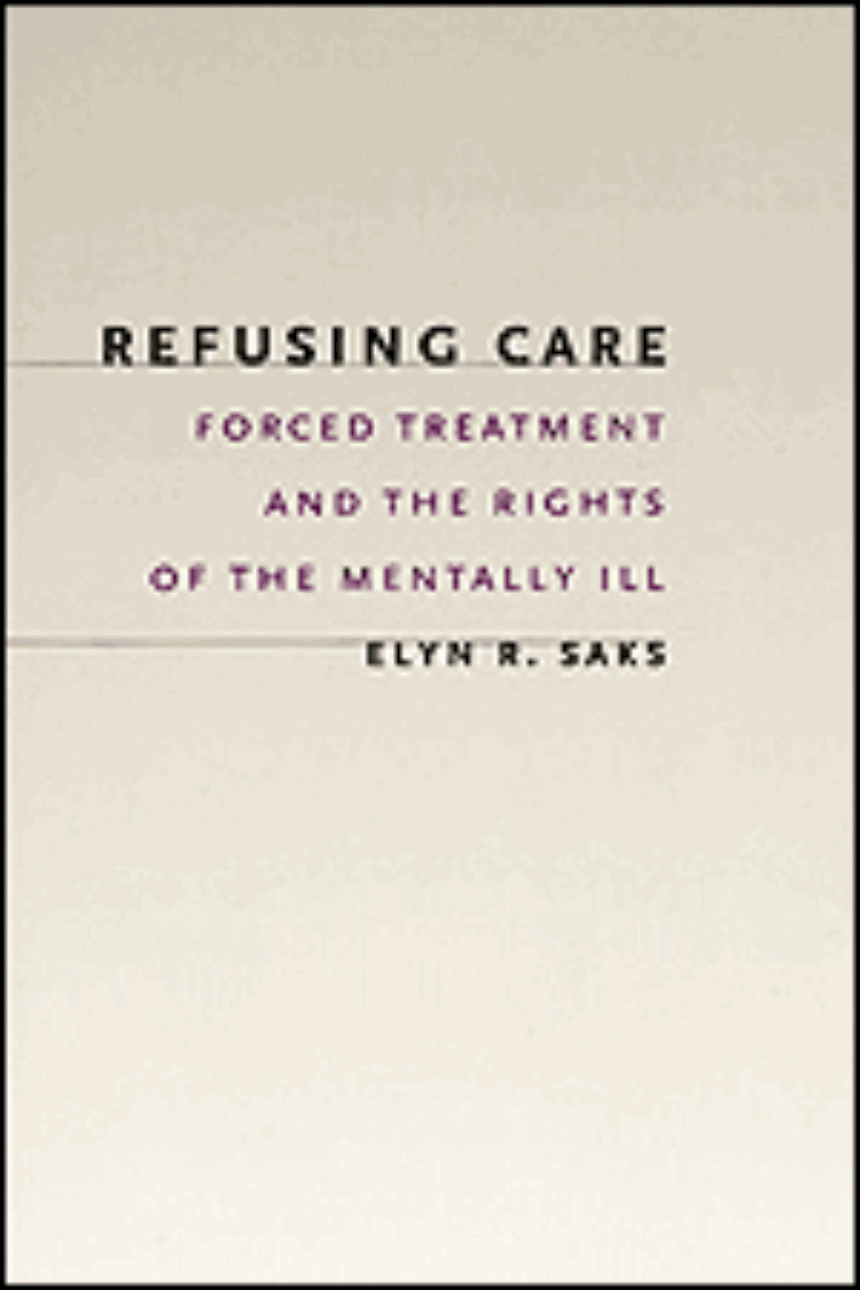Refusing Care
Forced Treatment and the Rights of the Mentally Ill
It has been said that how a society treats its least well-off members speaks volumes about its humanity. If so, our treatment of the mentally ill suggests that American society is inhumane: swinging between overintervention and utter neglect, we sometimes force extreme treatments on those who do not want them, and at other times discharge mentally ill patients who do want treatment without providing adequate resources for their care in the community.
Focusing on overinterventionist approaches, Refusing Care explores when, if ever, the mentally ill should be treated against their will. Basing her analysis on case and empirical studies, Elyn R. Saks explores dilemmas raised by forced treatment in three contexts—civil commitment (forced hospitalization for noncriminals), medication, and seclusion and restraints. Saks argues that the best way to solve each of these dilemmas is, paradoxically, to be both more protective of individual autonomy and more paternalistic than current law calls for. For instance, while Saks advocates relaxing the standards for first commitment after a psychotic episode, she also would prohibit extreme mechanical restraints (such as tying someone spread-eagled to a bed). Finally, because of the often extreme prejudice against the mentally ill in American society, Saks proposes standards that, as much as possible, should apply equally to non-mentally ill and mentally ill people alike.
Mental health professionals, lawyers, disability rights activists, and anyone who wants to learn more about the way the mentally ill are treated—and ought to be treated—in the United States should read Refusing Care.
Focusing on overinterventionist approaches, Refusing Care explores when, if ever, the mentally ill should be treated against their will. Basing her analysis on case and empirical studies, Elyn R. Saks explores dilemmas raised by forced treatment in three contexts—civil commitment (forced hospitalization for noncriminals), medication, and seclusion and restraints. Saks argues that the best way to solve each of these dilemmas is, paradoxically, to be both more protective of individual autonomy and more paternalistic than current law calls for. For instance, while Saks advocates relaxing the standards for first commitment after a psychotic episode, she also would prohibit extreme mechanical restraints (such as tying someone spread-eagled to a bed). Finally, because of the often extreme prejudice against the mentally ill in American society, Saks proposes standards that, as much as possible, should apply equally to non-mentally ill and mentally ill people alike.
Mental health professionals, lawyers, disability rights activists, and anyone who wants to learn more about the way the mentally ill are treated—and ought to be treated—in the United States should read Refusing Care.
Table of Contents
Acknowledgments
Introduction
1. Doctors and Lawyers: Why Can’t We All Just Get Along?
2. Mental Illness: Making Myths or Genuine Disorders?
3. Civil Commitment: How Civil?
4. The Right to Refuse Medication: When Can I Just Say No?
5. Seclusion: The Path of Least Resistance?
6. Mechanical Restraints: Loosening the Bonds
7. Incompetency and Impairment: Choices Made, Choices Denied
8. Self-Binding: Ulysses at the Mast
9. Conclusion
Notes
References
Index
Introduction
1. Doctors and Lawyers: Why Can’t We All Just Get Along?
2. Mental Illness: Making Myths or Genuine Disorders?
3. Civil Commitment: How Civil?
4. The Right to Refuse Medication: When Can I Just Say No?
5. Seclusion: The Path of Least Resistance?
6. Mechanical Restraints: Loosening the Bonds
7. Incompetency and Impairment: Choices Made, Choices Denied
8. Self-Binding: Ulysses at the Mast
9. Conclusion
Notes
References
Index
